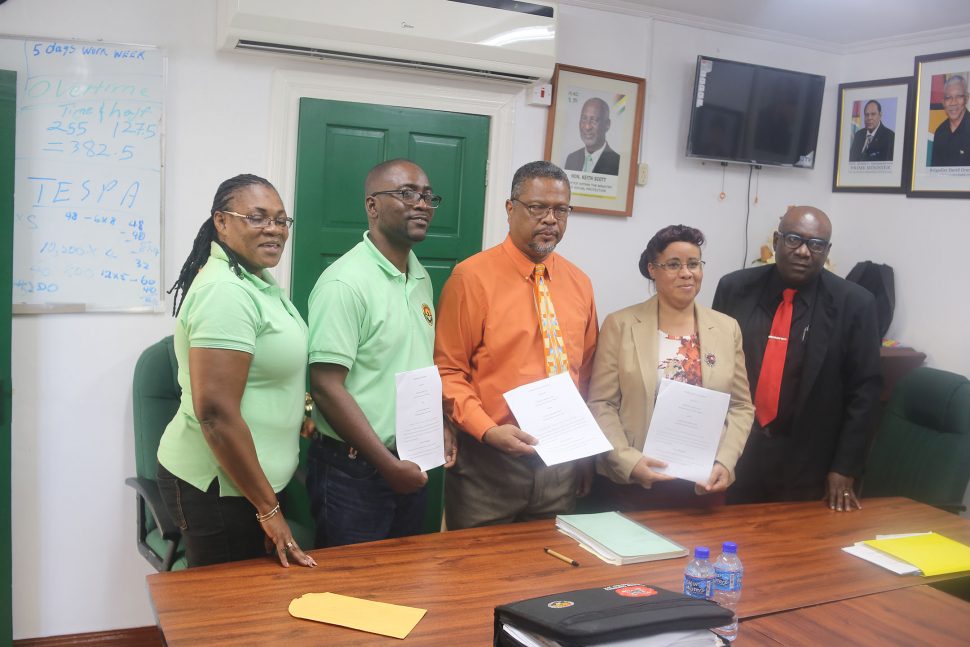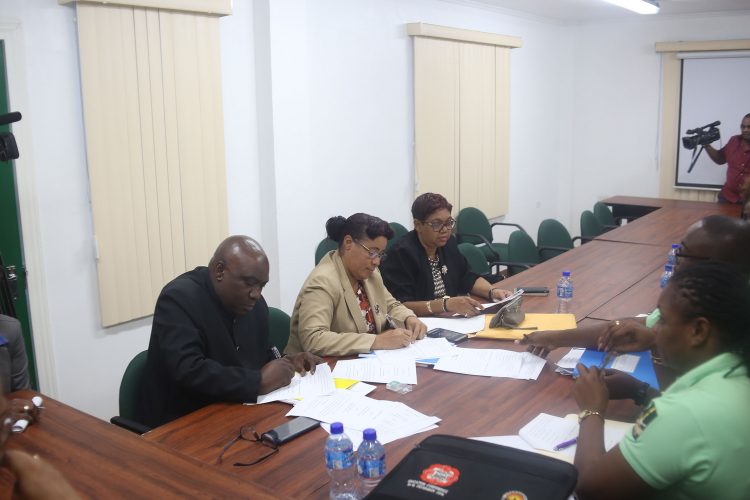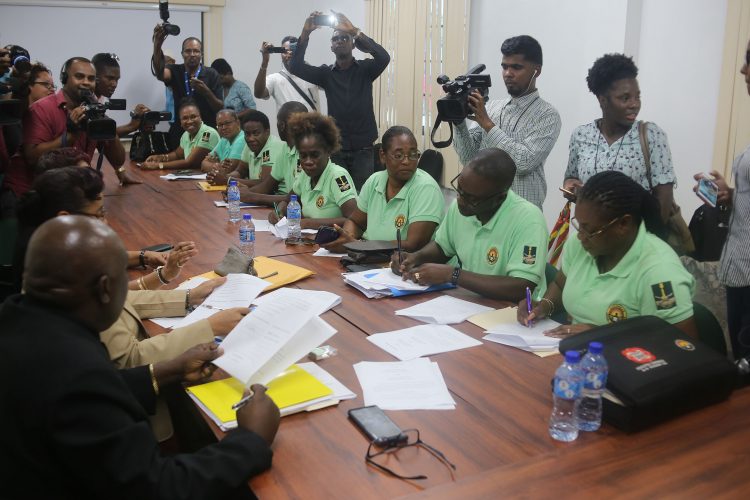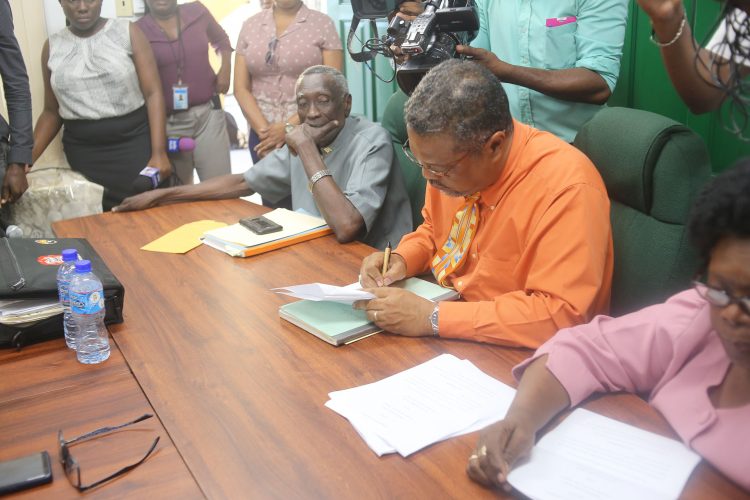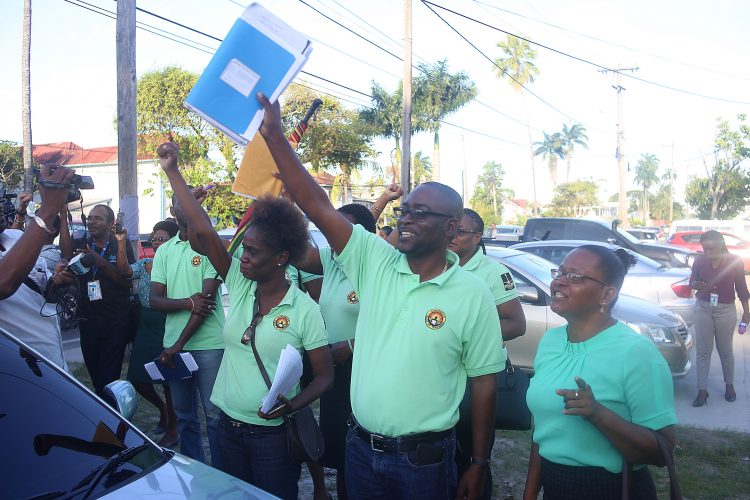The nationwide teachers’ strike has come to an end after the Guyana Teachers’ Union (GTU) and the Ministry of Education (MoE) yesterday agreed to take their dispute over wages and non-salary benefits to arbitration.
“We have signed on to terms of resumption… the union will be calling the strike off with immediate effect. For those who can, they will return to work tomorrow [today] but we are sure that full resumption will be on Monday,” GTU President Mark Lyte told reporters yesterday.
The terms signed on to by the parties to the dispute further indicate that there will be no victimisation by either side; there shall be no loss of pay and seniority and the status quo ante, that is, the conditions in relation to wages, salaries and non-salary benefits which existed before the strike will prevail.
Most importantly, the terms indicate that within 24 hours after full resumption the parties will meet to determine the terms of reference for the Arbitration Panel, as guided by the 1990 Memorandum of Agreement between the MoE and the GTU.
With thousands of teachers withdrawing their services and taking to the streets to protest this week, the MoE implemented a contingency plan which saw student teachers, retired teachers and volunteers take to the classrooms.
However, with the number of teachers engaged in strike action increasing every day, the Ministry yesterday signalled its intention to agree to the union’s demand to proceed to arbitration and the two parties met yesterday.
Outside of the Department of Labour on Brickdam yesterday, Lyte stressed to the nearly 100 teachers who joyously greeted his declarations that once the dispute goes to the arbitration panel, it is out of their hands.
“The matter now is… in the hands of arbitrators, who will take a lot of things into consideration and a decision will be made which will be binding on both sides and for that I want you to know that it is out of the hands of the GTU, out of the hands of the government and into the hands of the three arbitrators. They will look at cost of living and every other thing to determine what is a livable wage for teachers,” he explained.
He further explained to Stabroek News that the strike action was called off before the drafting of the Terms of Reference for the panel because “it’s the first step which we are mandated to follow by the Labour Act.”
He also indicated that the union will be proceeding to arbitration to discuss a multi-year proposal as submitted in December, 2015 and not a 2018 offer as indicated by President David Granger last week.
Since 2015, the union has been attempting to negotiate a multi-year salary and non-salary benefit package with the APNU+AFC government but negotiations have dragged on. An October, 2017 breakdown in negotiations and a declaration by the union that its members would proceed on strike led to an intervention by President David Granger, who set up a High Level Task Force to continue negotiations.
The Task Force met for five months and recommended that Cabinet consider granting teachers a 40% increase on 2015 salaries and a 5% increase for each of the four remaining years of the agreement.
However, citing the high cost of the recommended increase, $4 billion for teachers and $10 billion if extended to all public servants, the administration rejected the report of the Task Force as deficient.
Teachers were instead offered a $700 million ball park figure for 2018 salary increases. This was rejected and the GTU decided to engage in strike action beginning in the pre-term on August 27th.
The MoE had previously sought to have the dispute be taken for conciliation by the Department of Labour but the union pushed for arbitration, arguing that both the Minister responsible for Labour, Keith Scott, and the Chief Labour Officer Charles Ogle had compromised their ability to act as conciliators by sitting at the negotiation table on behalf of government.
Scott, however, maintained that while he should not have been at the negotiation table, his department would not abdicate their mandated function and he argued that there was no other body more qualified to be conciliator than the “experts” at the labour department.
Though the union had argued that it would not be participating in conciliation and hailed yesterday’s agreement as a victory, the terms of resumption signed after four hours of discussion refer to the meeting as “conciliatory discussion… under the chairmanship of the Ministry of Social Protection.”
In a statement yesterday, the Guyana Trades Union Congress (GTUC) said that the teachers have demonstrated good faith once again and government must now prove its receptiveness.
“Today the Guyana Teachers Union (GTU) has agreed to Terms of Resumption which brings the teachers’ strike to an end. What is to be agreed upon is the appointment of the arbitration panel and the establishment of the Terms of Reference for the arbitration. The Guyana Trades Union Congress has been advised the parties (Ministry of Education and GTU) will meet next Tuesday, 11th September 2018 to address same.
“There are two issues before the nation on the teachers’ issue- 1) bringing the strike to an end; and 2) addressing the issue of improvement in salaries and working conditions.
“The ball is once again placed in the Government’s court and shows another demonstration of the GTU to negotiate in good faith. Government therefore has the responsibility to work with the Union in an environment of mutual respect and hammer out the Terms of Reference and modalities for arbitration.
“As it stands right now the matter of improved salary and working conditions is yet to be resolved. The trade union and society must remain vigilant until this issue has come to finality”.
